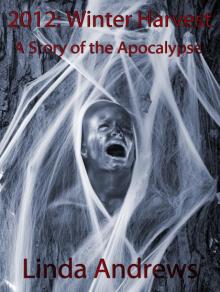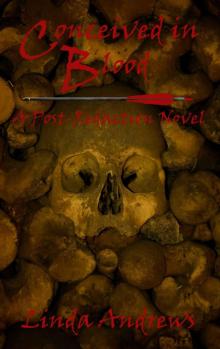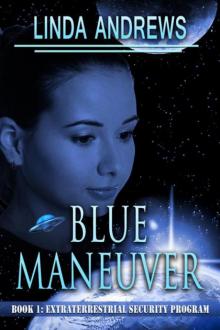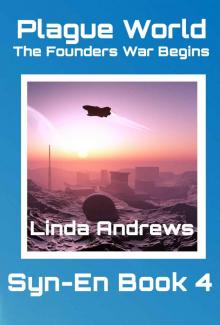- Home
- Linda Andrews
Redaction: Dark Hope Part III Page 5
Redaction: Dark Hope Part III Read online
Page 5
Bonnie’s pink lips nearly disappeared as they thinned.
Fear lodged in his throat. He swallowed hard. What rule had he broken now?
“Now, Emmanuel, I know you mean well but these people have very simple tastes.” She waved her hand at the rows of brown Meals-Ready-to-Eat pouches waiting to be served for dinner. “We can’t start introducing complex flavors to a palate accustomed to these, can we?”
He shifted his weight from foot to foot. He’d deliberately grown the herb garden to add flavor to everyone’s meals. “I just thought—”
“Of course, your intentions are good. And I’m envious of the green thumb most of your people seem to have.”
He stiffened. His people? He eyed his tan skin. Really? At the end of the world, some folks still saw him as a dumb Mexican?
“Oh, dear.” She raised her hand to her lips. “I didn’t mean to insult your heritage. I guess the little green-eyed monster got the better of me.” Leaning in close to him, she lowered her voice. “I can’t grow anything. In fact, I’ve been known to kill plastic plants.”
The tension knotting his shoulders eased but he still felt a twinge in his gut. Maybe he’d been a tad too sensitive about his heritage. Bonnie was always talking about those people and that kind. Maybe it was because English wasn’t her first language. He used the towel to wipe down the countertop.
“You’re such a good boy, Emmanuel.” Bonnie patted his arm.
Boy? Sure he might only be seventeen, but he was a man. He scratched a stuck-on leaf off the stainless-steel countertop. Hell, he didn’t think there were any children in the whole mine network. Not after everything they’d seen, heard, and lived through.
“If I had a son, I’d want him to be just like you.” After a quick squeeze, she released him and straightened her chef’s coat.
Okay, maybe he was being Mr. Sensitive. No one would insult a person in one breath then liken him to her own child in the next, would she?
“Why don’t I clean up here while you go check on those potatoes.” When she looked down at the countertop, she wrinkled her nose. “The farmers should have been at work ten minutes ago.”
Manny glanced at the surface. Not a smear of juice or a stray seed in sight. “Okay. Sure.”
Anything to get away. Leaving the rag on the counter, he fumbled with the knot securing his apron. Sometimes her cleaning OCD set his teeth on edge. He resisted the urge to touch the stoves and ovens, smearing them with his fingerprints as he passed. Folding the fabric into a neat square, he set it on the table near the buffet separating the kitchen from the dining hall.
Bonnie couldn’t help herself.
He had to remember that. Besides, he had been a bit of a clean freak after his folks had died. Especially after learning the Redaction virus had lived on surfaces for over a week. Of course, the niños had cured him of that pretty quick. He couldn’t keep a clean house with four young children underfoot.
Shaking off his thoughts, Manny followed the wall of ovens to the end. He rounded the serving line and stepped into the dining area. Metal folding chairs and tables filled the fifty-foot cavern. In the front, airplane wings had been welded together to form a stage. Behind it hung a sheet of white canvas that acted as a screen for the projector, caged in a repurposed pet carrier hanging from the ceiling.
After he cleaned up tonight’s meal, he’d have to get rid of the tables for movie time. He hoped the feature was something other than giant radioactive bugs. He could do without the nightmares. Of course, only a few had thought to pack movies during the evacuation and anything was better than cutesy cartoons.
Threading a path between the tables, he made his way to the shed tucked in the back corner. Hammer indentations and soot marked where the soldiers had torn the plane apart to be repurposed in the mines. He shivered in a draft. They were dead now. Many dying on the job, leaving him to find them in the morning.
And see them forever after.
Sometimes, he could swear he heard them coughing. His arms twitched. He shook them out. That was over and done now. The last one had died ten days ago. So why could he see one propped in the corner or another sprawled across the threshold of the storage unit?
Stop it! He liked his job. Liked cooking. Ghosts didn’t exist. He reached for the lock on the airplane door and paused. The hasp wasn’t fully seated in the padlock. Holy shit. Had he forgotten to lock it? Sweat bubbled on his upper lip. He glanced toward the kitchen.
Bonnie couldn’t see him from the kitchen. But that didn’t mean she hadn’t checked the unit.
After the thefts of tomatoes and two cases of MREs, they’d been extra careful. He twisted his wrist then lifted the lock free. Guess she hadn’t checked it this morning or she would have reamed him a new one. She was more paranoid about the lock than he was.
Manny opened the door and reached around the metal wall. With a flick of a switch, light flooded the ten-by-twenty-foot storage room. He scanned the nearly empty room. Sitting by the door, tomatoes filled two fabric grocery bags. A stray leaf lay beside them. Empty MRE boxes were stacked in neat towers by a galvanized conveyor table. The rollers waited for potatoes and other goodies to come up the conveyor belt that snaked down to the greenhouses.
He grabbed the Geiger counter off its hook and switched it on. It blipped once then remained silent. The lights flickered again. Bonnie really shouldn’t complain so much. Everyone was doing his best. Sure, some did better than others, but most at least tried. They all knew the stakes: Life or death.
The readout ticked up to seven as he walked deeper into the room. His heart leapt with every beep. Still okay. It was in milli-something or other. And it took lots of milli-somethings before he’d get sick.
He took another step, heading for the triple-paned windows separating the storeroom from the lead-lined conveyor belt. The readout jumped a hundred.
What the fuck? He thumped it against the heel of his hand. It leapt another two hundred. The hair on the back of his neck rose. Grit crunched under his heel. Had the radiation gotten inside?
Manny glanced down, lowering the Geiger counter. The readout purred until it reached one thousand seventy-two. His mouth dried.
Jesus! That would make him sick. He backpedaled toward the door. His left foot shot out from under him. His right knee buckled. He dropped to the floor in a half split. Pain zipped up his thigh. His teeth clicked together, the impact traveled up his spine until he felt sure his brain hit the top of his skull.
The Geiger counter slipped from his hand. The numbers continued to climb. Two thousand. Three. Three and a half.
He had to get out of here. Now! His nails dug into stone, bent under his weight and ripped. He ignored the burn and scrambled backward. The conveyor must have been breached. Radiation was getting inside.
He had to tell someone.
Flipping over, he sprang to his feet and jumped the two feet to the door. He swung for the doorknob. Missed. The counter continued to spiral higher, deleting days of his life with each tick. He tried for the handle again.
Over the panic drumming in his ear, he heard the window to the conveyor slide open. He turned.
His fingers closed around the knob just as a hand reached through the opening.
Chapter Six
“Miz S?”
Audra Silvestre set her hand on the stack of tablet computers and looked up. Most of her students stood by the arched exit near Faye Eichmann. Audra nodded to the thin woman before looking toward the front of her cavern-turned classroom.
Oscar Renault traced patterns on his desk in the front. The algebra problem projected onto his khaki sleeve. Propping a hip against the six-foot long table, he glared at two of his classmates.
Two ninth-grade twins, Pete and Paul, covered their smiles and pretended to be absorbed in solving the equation.
Good gracious. Now what were those two up to? And why did they always make Oscar the butt of their jokes? Everyone appreciated a little humor, but she had to make sure it stayed friend
ly and didn’t bleed into bullying. Audra smoothed the edges of her sweater. “Yes, Oscar? Do you have a question about the problem?”
“Nope.” Oscar chewed on his bottom lip for a moment.
Pete jerked his head in Audra’s direction.
She hadn’t thought Oscar had a problem. He understood math far better than English. Her fingers drummed the tablet on top of her stack and waited. Rushing the boy wouldn’t do any good. Oscar would talk when he was ready. Her stomach growled and she set her hand over it. She hoped he’d be ready soon. She was hungry and cold MREs were not very tasty. “Oscar?”
Oscar puffed out his chest. “Is it true that one radioactive potato can feed everyone in the class because they’re so big from the radiation and they have to be hauled in a wheelbarrow and they can barely fit through the door?” His chest deflated as he talked. Finally, he wheezed to a stop.
Audra blinked. She felt her skull hum as she tried to sort through the words. A complete sentence lurked in there. Somewhere. Maybe. She mentally grabbed the repeated word. “You think the vegetables have been irradiated.”
He nodded and a lock of dark-red hair dripped over his forehead.
At least she was on the right track—now to connect the stations. “And you think irradiating the vegetables made them very large.”
Oscar nodded again. “Someone said that one potato is big enough to provide French Fries for the whole class.”
Pete and Paul stopped pretending to look at the equation and tilted their heads to the left, waiting. The rustle of fabric behind her quieted. Eyes bored into her back. Apparently, this tidbit wasn’t new. Yet, this was the first time she’d heard it.
“Is it true, Audra?” Faye’s soft voice echoed around the cavern.
Wonderful, now even the adults believed such silliness.
“No, it’s not true.” Leaving the stack, Audra inched down the aisle. She picked up the tablets on the right and left as she passed. “Where did you hear such a thing?”
“The movie. Giant ants were eating people because of the radiation.” Oscar thrust both hands in his back pockets. His jeans scooched lower to flirt with the hem of his polo shirt but didn’t bunch around his knees.
Small miracle. Audra cleared the row of computers then turned right and headed toward the front of the classroom. “That was a movie. It’s make believe, not real at all.”
She hoped. Bugs were icky enough when they flew at you. Surely, if God was in Heaven, He wouldn’t make them the size of minivans or city buses. There wasn’t a shoe big enough to squish that.
Pete shoved Oscar’s shoulder. “Told you.”
“How do you know, Miz S?” Oscar folded his arms over his chest. His bottom jaw thrust forward.
Why couldn’t the boy be as curious about dangling participles and verb tenses? Balancing the computers in one arm, Audra stopped by a footlocker bolted into the wall near the whiteboard. “How do I know it’s a movie? My Dad and I watched B-movies when I was growing up, and I remember that one.”
She also remembered breaking her brother’s ant farm while checking to make sure the critters hadn’t doubled in size overnight.
“Not that.” Oscar shook his head. “About the radiation growing the food.”
Sighing, she stood on tiptoe and reached for the buckles of the footlocker. The kid was stubborn. Fortunately, a Silvestre had obstinacy as a base pair in their DNA sequence. “Once I’d learned we’d spend the rest of our lives in a cave, I looked up everything I could on radiation and its effects. Radiation kills plants and animals, Oscar. It doesn’t give them superpowers.”
“Yeah, but—”
She flashed her palm at him—the universal stop sign.
His teeth clicked together.
“We’ll discuss this in science class.” She shooed him and the other two boys toward the line. “After lunch. Now go.”
The trio hustled to the back of the room. When Faye led the students into the tunnel, Audra turned her attention to the footlocker and carefully organized the tablets inside. Radiation growing mutant sized food. She chuckled. What would they think of next?
“What’s so funny?”
Audra set the last computer in place and rubbed the red marks from her arm. Turning, she spied her friend Tina Tsao picking up the rest of the tablets from the desk. “Apparently last night’s movie has the children thinking we’re sowing mammoth-sized fruits and vegetables.”
“I wish.” Tina’s black ponytail wiggled down her back when she walked toward the locker. “I practically drool every time I think of eating French fries. Dinner cannot come soon enough for me.”
“I know what you mean. I dream of the day there’ll be salads. Crisp lettuce, crunchy celery and carrots. Tomatoes with salt and fresh basil.” Saliva pooled in her mouth. Absence didn’t affect her heart so much as her taste buds.
“You always were the salad queen.” Tina shut the locker. Metal rattled when she lashed the chains over the four sides then padlocked them together. “When the Redaction hit, you were demoted to Princess.” When she giggled, Tina’s almond-shaped brown eyes nearly disappeared. “Get it. Eddie calls you Princess.”
Audra waved her hand in the air. Yeah, she understood the reference. Unfortunately, her boyfriend Eddie called her Princess when he wanted to put distance between them. It was beginning to annoy her. “I hear they’re making cheese with the goats’ milk.”
She bit back a groan. As changes of subjects go, that one was about as subtle as a hatchet in a china shop.
Tina tucked her arm through Audra’s and tugged her toward the door. “Troubles in paradise?”
“No!” Great, screams of denial were ever so believable. They turned into the tunnel. With every other light being out to conserve power, the rock walls pressed in on her. She focused on her breathing. In. Out. In. Out. Left foot, right foot. Soon the tunnel would widen. Soon, there’d be air to breathe. “No.”
Tina squeezed her forearm. “You should see Falcon about your claustrophobia.”
“I already have.” Many times. The shrinkin-training taught her breathing exercises but not much else. Audra eyed the bare bulb overhead before glancing at the dots of light on the ground. Lord o’ mercy, when would this need to jump from one spot to the next leave her? She kept her pace steady but the tremors rattled through her.
“Maybe you should go more often.”
Maybe Tina should stop using up all the oxygen. Audra paused under a return. Cold air poured out of the metal grate. Her nose tingled.
“Eddie starts his new job today.” Tina glanced up and down the corridor.
Two men stood near a junction box. The older man shook his head. “Black to black. Don’t mix the colors.”
“Hey, I became an accountant so I didn’t have to do menial labor.”
“Menial labor?”
Audra tuned them out.
“Yes, he starts today.” He’d been working on the electrolysis machines for weeks. But today, he’d be around them for ten hours. Given how frequently they went down, she didn’t like the odds that one wouldn’t blow himself up due to a stray spark sometime within the week.
Today’s power outage didn’t help.
She couldn’t lose Eddie. Not after everything they’ve been through. Her fingers curled into fists. She wouldn’t lose him. Audra clasped the quartz crystal he’d given her, slid it along the string around her neck. Not that Eddie wasn’t smart or good with his hands. Heat shimmered inside her. Very good with his hands.
But those machines were dangerous and unpredictable.
“Hey, girlie!”
Audra stopped cold and set her hands on her hips. Surely, he was not speaking to her.
Tina shrugged.
“Wait up a minute.” Footsteps pounded behind her. A moment later, one of electricians skidded to a stop in front of her. He gasped for breath and stared at her chest.
How positively rude. Now that they were safe, manners should be observed. “Sir, I would–”
He raked his broken nails down her chest and hooked her necklace.
What in the world? Audra twisted at the waist and raised her hand to block his attack. The string bit into her neck then snapped.
The man sprinted away.
Good Lord. She’d just be mugged. No way! She leapt to follow but something held her back.
“Are you nuts?” Tina held her waistband with both hands. “The necklace isn’t worth it.”
Audra batted at her friend’s hands. She could still catch the stealing jerk. “Eddie gave me that. He made it for me.”
“Then he can make you another. He wouldn’t want you to get hurt over a crystal.”
He wouldn’t want her to get hurt period. The thief disappeared into another tunnel—one that branched into three directions.
“Fine.” She rubbed her neck and winced at the sore spot. She’d bruise soon.
“Besides, it’s not like he can go far. We’ll just report him to the nearest cop.” Tina grinned.
Audra rubbed the blood between her thumb and index finger. The cops had better find him before Eddie did. “What is it with you and cops?”
She sincerely hoped her friend was mourning the loss of Deputy Pecos, not looking for his surrogate.
The whites of Tina’s eyes glowed in the dim light. “Doesn’t everyone love a man in uniform? The way their pants cup their backsides.”
“Okay. Okay. I get it.”
“Yes, you do. Practically every night.”
Audra’s cheeks burned. Good gracious, was the woman implying what she thought she was?
When the tunnel forked, Tina bumped into her, steering her down the right one. “You may have to take turns canoodling in the corner with the way your mother is making eyes at Principal Dunn.”
Her mother and Principal Dunn? Audra tripped over her feet. Reaching out, she grabbed the clammy stone and found her footing. “You’re making that up.”
“Am I?” Tina dropped her arm. “Or have you been so lost in Eddie that you haven’t paid attention to what’s going on around you?”

 2012: Winter Harvest
2012: Winter Harvest_preview.jpg) The Love Lottery (Paranormal Romance)
The Love Lottery (Paranormal Romance) Love on Cloud Nine
Love on Cloud Nine_preview.jpg) The Syn-En Solution (SciFi Adventure)
The Syn-En Solution (SciFi Adventure) Blue Maneuver-Urban SciFi/Fantasy (Extraterrestrial security program)
Blue Maneuver-Urban SciFi/Fantasy (Extraterrestrial security program) The Syn-En Solution
The Syn-En Solution Conceived in Blood, A Post-Apocalyptic/Dystopian Novel
Conceived in Blood, A Post-Apocalyptic/Dystopian Novel Blue Maneuver
Blue Maneuver Syn-En: Pillar World
Syn-En: Pillar World Redaction: Dark Hope Part III
Redaction: Dark Hope Part III Syn-En: Plague World: The Founders War Begins
Syn-En: Plague World: The Founders War Begins Syn-En: Registration
Syn-En: Registration The Love Lottery
The Love Lottery